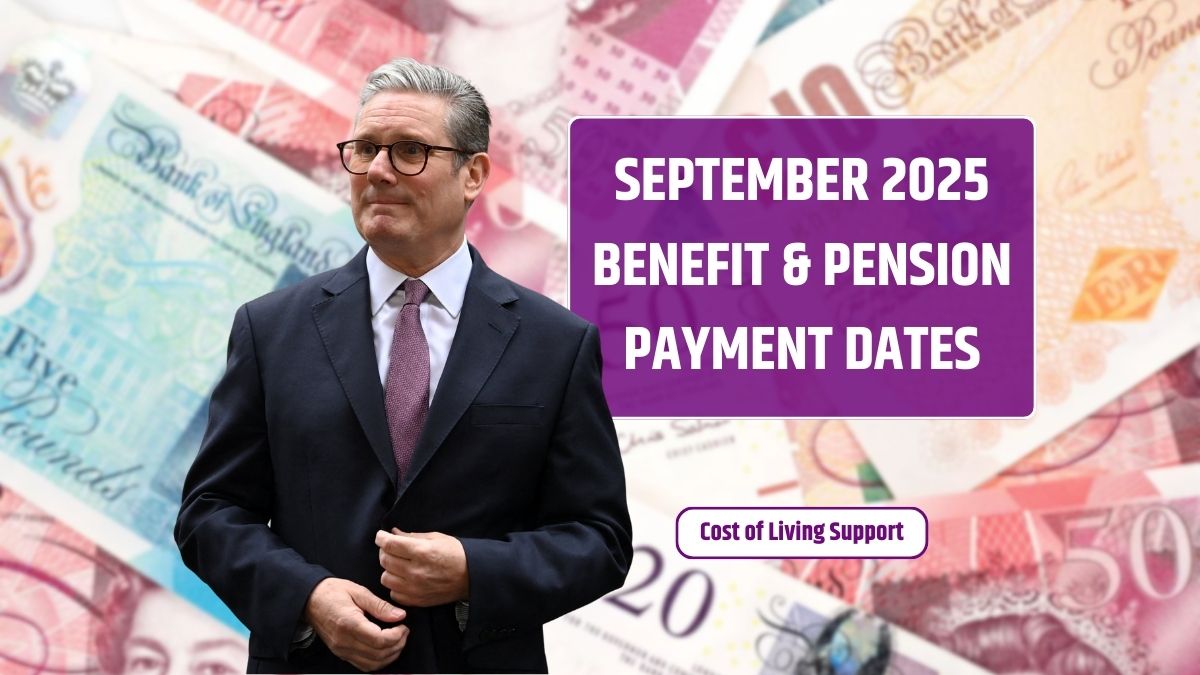As summer winds down and families across the UK start wrapping up the school holidays, some financial pressure may finally begin to ease. But for many, the struggle to manage daily expenses continues. Rising prices and stagnant wages mean millions are still feeling the pinch.
Despite inflation stabilising, the actual cost of essentials like food, energy, and housing remains high. According to recent figures, over 7 million adults faced food insecurity in early 2025. On top of that, energy debt hit £3.9 billion by the end of 2024—double what it was five years ago.
If you’re among the 24 million people receiving support from the DWP or think you might qualify, now’s a good time to check what help is available.
Table of Contents
Payments
For September 2025, benefit payments will follow the usual schedule, since there are no bank holidays affecting payout days. Here’s what to expect:
Payments being made include:
- Universal Credit
- State Pension
- Pension Credit
- Child Benefit
- Disability Living Allowance
- Personal Independence Payment (PIP)
- Attendance Allowance
- Carer’s Allowance
- Employment Support Allowance (ESA)
- Income Support
- Jobseeker’s Allowance
If you’re on legacy benefits like tax credits or housing benefit, the DWP is continuing to move claimants over to Universal Credit. This transition should be completed by January 2026, and many households will have already received notices.
Pensions
State Pension payments are made every four weeks, with the payment day determined by the last two digits of your National Insurance number.
| NI Number Ends In | Payment Day |
|---|---|
| 00 to 19 | Monday |
| 20 to 39 | Tuesday |
| 40 to 59 | Wednesday |
| 60 to 79 | Thursday |
| 80 to 99 | Friday |
Payments are sent directly to bank accounts. If your regular payment date lands on a weekend or holiday, you may receive it earlier.
Increases
Earlier this year, all working-age benefits—including Universal Credit, PIP, ESA, and others—were increased by 1.7 percent, matching inflation as of September 2024.
State Pension payments went up by 4.1 percent in April 2025, thanks to the triple lock, giving pensioners an extra £472 annually.
Next April (2026), a new policy from the Labour government will raise Universal Credit above inflation, starting with a 2.3 percent increase. These yearly increases are planned through 2029. However, the health-related top-up will be cut for new claimants—from £105 to £50 monthly—and frozen until 2029.
Support
Here’s a quick guide to extra support available if you’re still finding it hard to keep up:
Budgeting Advance Loans
Available to Universal Credit claimants needing emergency cash. The max you can borrow is:
| Situation | Maximum Loan |
|---|---|
| Single person | £348 |
| Couple | £464 |
| With children | £812 |
These loans are interest-free and repaid via deductions from your future Universal Credit payments. From April 2025, deductions are capped at 15 percent of the standard allowance (down from 25 percent).
Discretionary Housing Payment (DHP)
If you’re on Housing Benefit or the housing element of Universal Credit, you may be able to claim DHP to cover rent shortfalls or moving costs. Apply through your local council.
Household Support Fund (HSF)
This local authority-run program can help with utility bills, food, appliances, and even direct cash support of up to £300. It runs until March 2026. Check your council’s website to apply.
Charitable Grants
Many charities offer financial help, depending on your situation—whether you’re a carer, unemployed, disabled, or a student. Turn2us offers a tool to search for grants.
Energy Help
Some energy providers offer support schemes. British Gas, EDF, Octopus, and others may reduce your bill or offer payment plans—just ask.
Council Tax Reduction
You could be entitled to a council tax discount of up to 100 percent. Some councils also offer discretionary help if you’re facing hardship. Apply via your local authority.
Free Childcare
From 1 September 2025, all working parents of children under 5 can claim 30 hours of free childcare per week. You must reapply every three months via the government’s website.
Energy
Good news—Ofgem’s energy price cap dropped 7 percent for July to September, bringing average yearly bills down from £1,849 to £1,720. The cap for October to December will be announced by the end of August.
Cost of Living Payments
There are currently no new Cost of Living Payments announced for 2025. The final round was issued in February 2024.
Mental Health
If you’re overwhelmed or struggling emotionally, support is out there. Samaritans is available 24/7 at 116 123. Mind also provides mental health support, including a welfare benefits advice line at 0300 222 5782.

